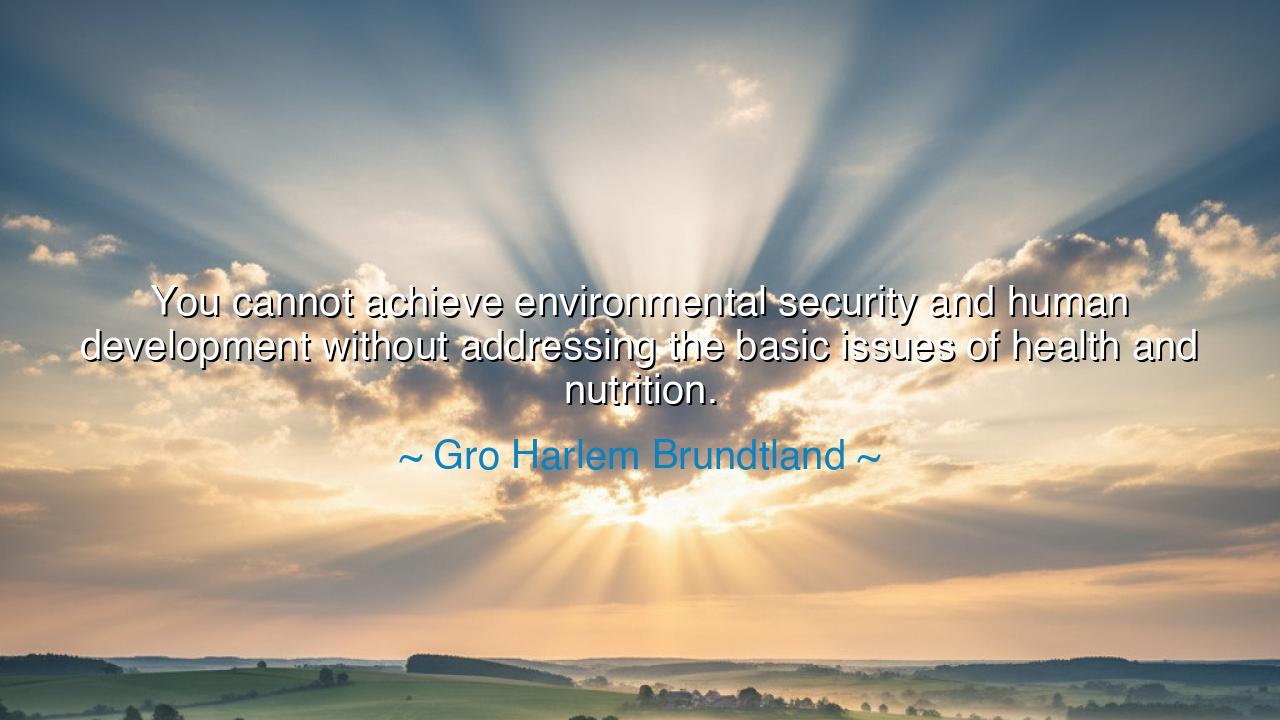
You cannot achieve environmental security and human development
You cannot achieve environmental security and human development without addressing the basic issues of health and nutrition.






In the noble and timeless words of Gro Harlem Brundtland, physician, stateswoman, and visionary of sustainable development, we find a truth both elemental and eternal: “You cannot achieve environmental security and human development without addressing the basic issues of health and nutrition.” This is not the declaration of a politician seeking applause, but the wisdom of one who has seen the intricate web that binds human life, the earth, and well-being together. Brundtland, who led the World Health Organization and shaped the modern understanding of sustainability, speaks here as both healer and guardian — reminding us that health, the vitality of the human body, and nutrition, the sustenance of life itself, are not luxuries, but the foundations upon which civilization rests.
In the age of abundance and industry, mankind has often sought progress through power — the conquering of nature, the accumulation of wealth, the building of cities that pierce the clouds. Yet Brundtland’s words remind us that all such achievements are hollow if the people who build them are sick, hungry, or weak. What is environmental security, if the air that sustains us poisons our lungs? What is human development, if the body that should thrive is starved of nourishment? Her message pierces through centuries of arrogance: the health of humanity and the health of the planet are one and the same. To neglect either is to unravel the fabric of life itself.
From her years as a physician in Norway, Brundtland saw firsthand how poverty and illness bind a people’s potential. She knew that a community cannot dream of protecting forests when its children hunger, nor can it care for rivers when its people thirst. Later, as chair of the World Commission on Environment and Development, she gave the world the concept of sustainable development — a vision that united ecology, economy, and equity. In her quote, we hear the echo of that same wisdom: that progress without compassion is an illusion, and that the health of the poor is as vital to the planet’s survival as the preservation of its forests and seas.
History offers its parables of this truth. In the time of the ancient Indus Valley Civilization, one of humanity’s earliest centers of urban life, the people flourished not through conquest or wealth, but through balance. They built advanced sanitation systems, cultivated fertile lands, and ensured clean water for all — understanding that public health was the cornerstone of civilization. But when floods, famine, and disease began to erode that balance, their mighty cities fell into ruin. The lesson was clear, and remains unchanged through the ages: when the body of the people weakens, so too does the body of the earth.
To address health and nutrition, as Brundtland urges, is not merely an act of kindness — it is a strategy for survival. A malnourished child cannot learn; a sick farmer cannot till the soil; a polluted village cannot prosper. When nations invest in hospitals, clean water, sustainable food systems, and preventive care, they do not only heal their people — they fortify their economies and safeguard their ecosystems. The care of the body becomes the care of the planet, for both draw breath from the same source. Thus, health and environment are twin guardians, bound by destiny: one cannot flourish while the other suffers.
And yet, her words also call for humility. Humanity has long acted as if the Earth were a servant — a machine to fuel our hunger for growth. But Brundtland reminds us that the Earth is a living system, and we are part of it. To poison its rivers is to poison our veins; to strip its soil is to starve our children. The path to true development must therefore begin not with domination, but with restoration — by healing the wounds we have inflicted upon both body and land. For when we nurture the soil that feeds us, and protect the air that fills our lungs, we honor the ancient covenant between humanity and nature.
The lesson, then, is clear: if you wish to build a lasting civilization, begin by feeding the hungry, healing the sick, and caring for the earth that sustains them. Let your policies, your inventions, your daily choices be guided by reverence for health — not only your own, but that of all life. Eat with mindfulness, waste nothing, support those who grow your food, and defend the waters and forests that nourish all. For these are not separate tasks, but a single sacred duty.
And so, children of the modern world, remember Gro Harlem Brundtland’s wisdom: no fortress, no economy, no empire can stand if its people are unwell and its environment wounded. True security does not come from walls or weapons, but from balance — from the harmony between humanity and the earth. When we heal one, we heal the other; when we feed one, we sustain both. For in the great circle of life, health is the root, nutrition the soil, and sustainability the harvest of wisdom.






AAdministratorAdministrator
Welcome, honored guests. Please leave a comment, we will respond soon